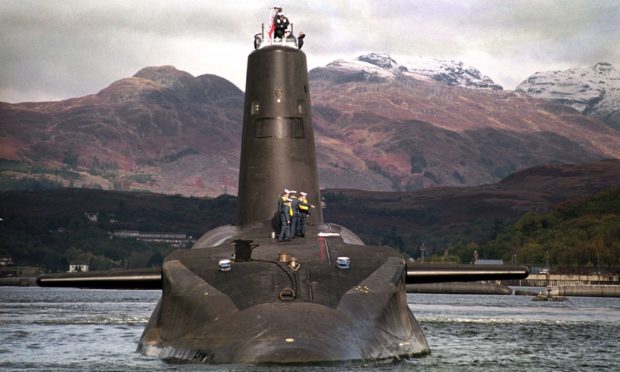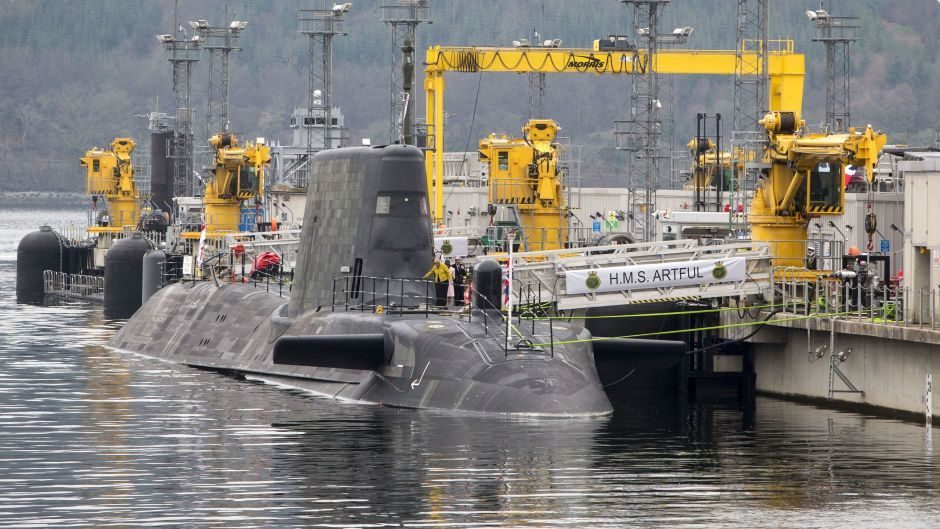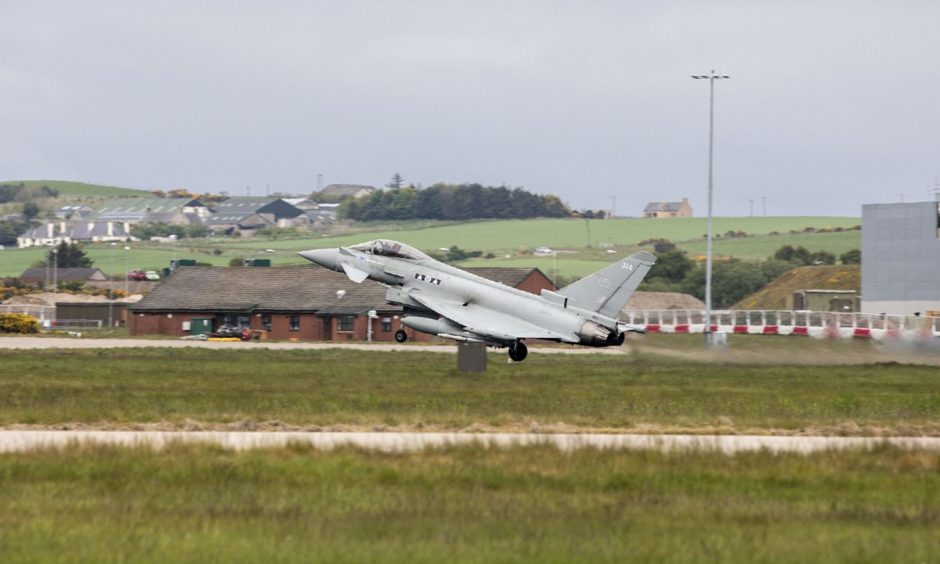An independent Scotland should finance its own defence forces by leasing military bases and charging the rest of the UK for housing nuclear weapons on the Clyde, a new paper has recommended.
The document produced by defence analyst Stuart Crawford, who once advised the SNP on military matters, and the economist Richard Marsh suggested Trident should remain at Faslane until an alternative base is built outside Scotland.
The independently-produced paper warned the four submarines which carry the missiles would have to stay in Scottish waters for “perhaps up to” 20 years, a prospect that would anger the SNP grassroots, which is passionately opposed to nuclear weapons.
Its authors said an independent Scotland could charge £200 million per year to retain Trident. The proposal is at the heart of the document Could an independent Scotland defend itself Scot-free?, which also recommended leasing the Lossiemouth airbase to the RAF and Nato.
Other military installations identified for similar treatment include the gunnery and bombing range at Cape Wrath, the ship replenishment facility at Invergordon, the tank gunnery ranges at Kirkcudbright and the missile testing range on Benbecula, which is already used by Nato allies.
Bringing our defence spending in line with the Nato European average would allow a comprehensive and bespoke posture for an independent Scotland. Not only does that mean a nuclear-free Faslane repurposed as the tri-service headquarters of our armed forces, that means us taking our responsibilities as a reliable neighbour in North Atlantic seriously.”
Stewart McDonald of the SNP
SNP defence spokesman Stewart McDonald MP maintained his party’s plans were for a “nuclear-free” Faslane, arguing that it would be unacceptable to try to secure independence “on the cheap”, while the SNP’s opponents argued the paper illustrated the practical difficulties of the SNP’s plan to ditch Trident.
This paper only goes to highlight how the plans to ditch our nuclear defences in an independent Scotland simply are completely impractical and illogical.”
Dean Lockhart, Conservative MSP
Conservative constitution spokesman Dean Lockhart said: “This paper only goes to highlight how the plans to ditch our nuclear defences in an independent Scotland simply are completely impractical and illogical.
“It is by being part of the United Kingdom that we can protect the thousands of jobs at Faslane and help to safeguard our vital nuclear defence system going forward.”
A smaller Scottish Defence Force
The authors also proposed a smaller conventional Scottish Defence Force than they previously envisaged in their 2012 paper, A’ the Blue Bonnets: Defending an Independent Scotland.
Before Brexit and the 2014 independence referendum, Mr Crawford suggested an independent Scotland would need a navy of 25 vessels and 1,500-2,000 personnel.
The army would have between 10,000 and 12,500 personnel supported by an air force of around 60 airframes and between 1,750 and 2,250 personnel.
The cost was estimated to be between £1.5 and £1.8 billion per year. Since then Mr Crawford has revised his estimates downwards by around 30% to a navy of 20 vessels and around 2,500 people and an air force of 50 aircraft and unmanned aerial vehicles as well as 2,000 personnel. In his latest proposal, Mr Crawford, a former army officer, suggested an army of 6,000 personnel with an allowance for headquarters to around 11,000.
The downward revision has resulted in Mr Crawford producing a reduced budget estimate of between £1.1bn and £1.3bn. An independent Scotland would not be able to afford either jet fighters or submarines, the paper said.
Leasing Faslane to the rest of the UK
The authors said those costs could be “defrayed” by leasing military bases. Of particular interest to the paper’s authors were Her Majesty’s Naval Base (HMNB) Clyde at Faslane/Coulport and RAF Lossiemouth.
HMNB Clyde was described as Scotland’s second-largest employer with around 11,000 jobs linked to the base, which will shortly be home to the UK’s entire submarine fleet in addition to the four vessels that carry Trident.
The paper noted it is “highly unlikely” that nuclear weapons would be removed from Faslane immediately upon independence because there is nowhere else suitable in the UK for them to go.
“Demanding their removal in short order would arguably be calling for the UK to unilaterally disarm, and the chance of that happening is close to zero. The USA, for one, would not countenance it and would block (an independent) Scotland’s accession to Nato,” the paper said.
Should Scotland still want Nato membership, the paper said the four nuclear-powered, ballistic missile armed submarines (SSBNs) would have to stay on the Clyde for up to 20 years.
When calculating how much an independent Scotland could charge the rest of the UK to keep Trident on the Clyde, the paper estimated that building a new base for the deterrent would cost £2bn. It also noted that £500m had been invested in Faslane in 2015 to establish a “submarine centre of excellence”.
The authors argued it would be reasonable for the rest of the UK to avoid replicating the recent investment in the Clyde and suggested rental of £200m per year for the “short to medium term”.
They noted that others had suggested an “overly ambitious” annual fee, but concluded such an approach was not credible.
“We believe it therefore to be a more pragmatic course of action for the rest of the UK Government to be prepared to pay up to £200 million per annum to retain Trident on the Clyde in an independent Scotland until other facilities are made ready,” they said.
The options for RAF Lossiemouth
When it came to RAF Lossiemouth, the paper noted it was one of only two main operating bases for the Eurofighter Typhoon FGR4 and was Scotland’s only operating flying RAF station.
Also operating from the base were Norwegian and US Poseidon aircraft. Claiming an independent Scotland would be unable to afford jet fighters, it argued the rest of the UK would still want secure airspace to the north.
“An answer might be, accordingly, that an independent Scotland might lease out all or some of the facilities at Lossiemouth to the RAF and/or Nato so they can continue to pursue their interests from there.
“Arguably Lossiemouth is already halfway towards becoming a de facto Nato airbase so why not go the whole hog and formalise the arrangement between the Scottish Government, the UK Government, and Nato?” the document said.
The authors calculated that with this approach the base would continue to sustain nearly 4,500 jobs across Scotland and generate some £300m in Gross Value Added (GVA) each year to the Scottish economy.
A further £700m of economic impact to the economy would accrue from sustaining an independent Scottish Defence Force plus the economic benefits of other Scottish bases, like Faslane, being used by the rest of the UK and Nato.
When the £200m rental for housing Trident was added to those figures, the authors suggested the £1.2bn would cover the cost of an independent Scotland’s defence force.
“Given that we suggest that the defence forces of an (independent) Scotland as per the latest iteration of our model might require a budget of between £1.1-£1.3 billion per annum, and that at the same time the economic value of Scottish bases remaining open for friendly countries and other organisations might accrue an economic benefit of up to £1.2 billion, then (an independent) Scotland might get its defence forces scot-free,” the paper said.
But Mr McDonald said: “Most Scots would find it unacceptable to have achieved their independence only to try to secure that independence on the cheap, and, I have to say, I agree – bringing our defence spending in line with the Nato European average would allow a comprehensive and bespoke posture for an independent Scotland.
“Not only does that mean a nuclear-free Faslane repurposed as the tri-service headquarters of our armed forces, that means us taking our responsibilities as a reliable neighbour in North Atlantic seriously, with a particular emphasis on our maritime EEZ, which is among the largest in Europe: the UK may have overlooked that for too long, and we need independence to change course.”
The removal of nuclear weapons from Scotland is in the SNP’s veins.”
Bill Ramsay, SNP CND group
Bill Ramsay, convener of the party’s CND group, said: “SNP policy is anti-nuclear. The removal of nuclear weapons from Scotland is in the SNP’s veins.
“So, it is more than highly unlikely that the SNP would say, in one of its first acts internationally, that an independent Scotland is a country that’s up for sale.
“It would be a huge blow to the prestige of an independent Scotland. The SNP and its politicians talk about Scotland contributing positively to international relations; if this was to be the case, this would be the antithesis of that.”
The paper acknowledged SNP CND’s position that keeping no such arrangement at Faslane should be contemplated, but argued that its lease proposal would “only delay their ultimate goal by a few years”.


